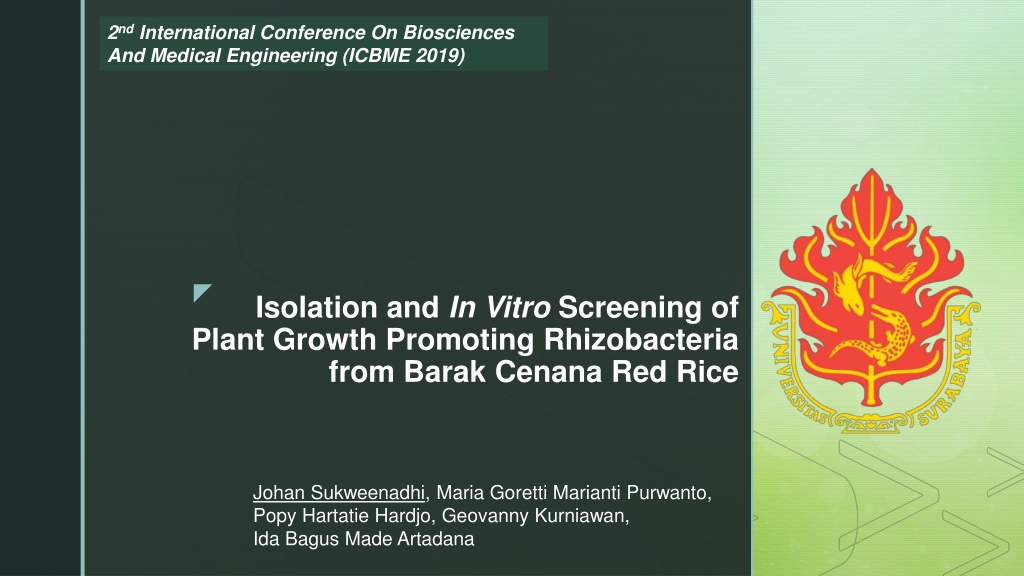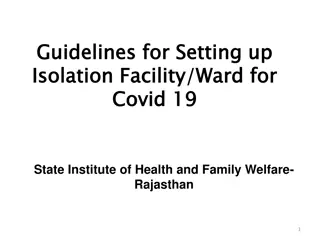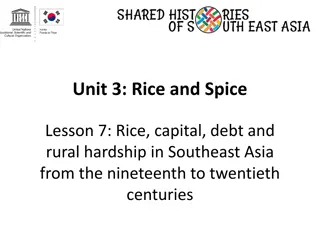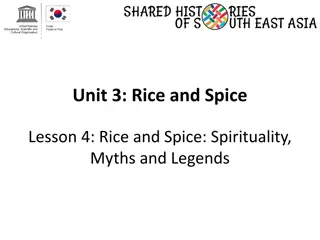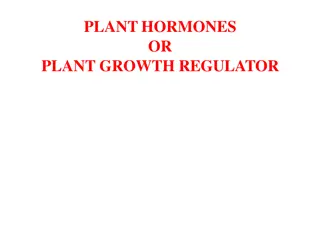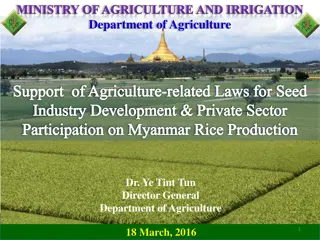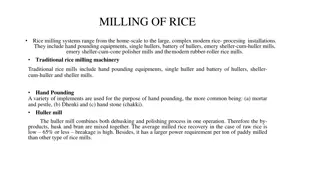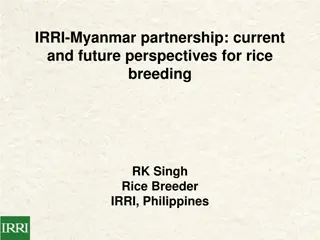Isolation and Screening of Plant Growth-Promoting Rhizobacteria from Barak Cenana Red Rice
This research focuses on isolating and screening plant growth-promoting rhizobacteria from Barak Cenana red rice, a local cultivar known for its high anthocyanin and vitamin B content. By studying the potential of these bacterial isolates as microbial inoculants, the aim is to improve the cultivation efficiency and productivity of Barak Cenana rice. Methods include screening bacterial isolates from the rhizosphere area of the rice plant and seeking those with plant growth-promoting properties.
- Plant Growth-Promoting Bacteria
- Rhizobacteria
- Barak Cenana Red Rice
- Agricultural Microbiology
- Crop Productivity
Download Presentation

Please find below an Image/Link to download the presentation.
The content on the website is provided AS IS for your information and personal use only. It may not be sold, licensed, or shared on other websites without obtaining consent from the author. Download presentation by click this link. If you encounter any issues during the download, it is possible that the publisher has removed the file from their server.
E N D
Presentation Transcript
2nd International Conference On Biosciences And Medical Engineering (ICBME 2019) Plant Growth Promoting Rhizobacteria from Barak Cenana Red Rice Isolation and In Vitro Screening of Johan Sukweenadhi, Maria Goretti Marianti Purwanto, Popy Hartatie Hardjo, Geovanny Kurniawan, Ida Bagus Made Artadana
2 Presentation Outline 01 Background 02 Research Aim 03 Method 04 Results 05 Conclusion
3 Background Barak Cenana as local cultivar of rice Barak Cenana are local cultivar of rice with high anthocyanin and vitamin B content. Screening of Plant Growth Promoting Bacteria from Barak Cenana Rice Potential use of PGPG as Microbial Inoculant Barak Cenana cultivation is not efficient Barak Cenana rice cultivation is less economical resulting in low productivity. The existence of plant-growth promoting bacteria (PGPB) has been much in demand for increasing crop productivity. PGPB usage to improve the crop yield
4 Barak Cenana Rice Barak Cenana rice was chosen because it is very popular in Tabanan, Bali but its height which up to two meters plus its planting age of more than six months makes farmers reluctant to plant it.
5 Plant Growth Promoting Bacteria COMMERCIAL CULTIVAR Plant with increased resistance against biotic and abiotic stress Plant Direct plant growth promotion Nutrient acquisition Biofertilizer Induced resistance Plant Strengthener Hormonal stimulation Phytostimulator Indirect plant growth promotion Antibiosis, Competition Biopesticide COMMERCIAL INNOCULANT Microorganisms with increased stress alleviated effect or plant growth promoting effect Plant pathogens Plant-associated microorganisms Disease suppression Plant growth promotion Schenk et al. (2012) Unraveling plant microbe interactions: can multi-species transcriptomics help? Trends in biotechnology 30:177-184.
6 Research Aim Screening the bacterial isolates from the rhizosphere (root system) area of the Barak Cenana Rice Looking for bacterial isolates that are potential to be plant-growth promoting bacteria inoculants from the Barak Cenana Rice
Method Rhizospheric Soil 1 Gram 9 ml Sterile Aquadest Vortexing gently Serial Dilution (10-2 sampai 10-6) Bacteria Isolation Isolate Purifciation into Pure Colony Enrichment using Tryptic Soy Agar 7
Culture Stock In vitro screening of PGPB: Auxin production (Glickmann dan Dessaux, 1995). Siderophores production (Schwyn and Neilands, 1987). Phosphate solubilization (Pikovskaya, 1948). DNA Isolation PCR 16s rRNA Electrophoresis 16s rRNA Sequencing Species Identification 8
Isolation and Purification of Bacteria The initial isolation of bacteria using semi-solid NFb media. An arrow indicates a white pellicle. Change the color of the solid NFb media to blue. 9
Isolation and Purification of Bacteria G1 G3b Gram (-) Rod, Short Gram (-) Comma, Tiny colonies G4c G3 Gram (-) Rod, Small Gram (-) Coccobasil, Small 10
Isolation and Purification of Bacteria G3c G3a Gram (-) Coccobasil, Small Gram (-) Rod, Small 11
Isolation and Purification of Bacteria G2 G4aa Gram (-) Gram (-) Rod, short, tiny colonies Coccobasil, Small G4bp G4ap Gram (-) Batang Kecil, Cenderung bergerombol12 Gram (-) Rod, Short
In vitro Production of Indole Acetic Acid (IAA) G3 and G4c isolates have the potential to be plant- growth-boosting agents based on In vitro production of IAA. 13
Siderophores Production K (-) G2 G4ap G4aa G1 G3c G4c G3 G4bp G3a G3b The results of the siderophores production test with incubation time for 3 days showed positive results, the area with bacterial culture was changed to yellow to orange. Note: the appearance of the bottom of the petri to see the medium area under the colony, K (-) is a negative control 14
Phosphate Solubilization G4aa G4c G3c G4ap G4bp G3a G2 G3b The results of phosphate dissolution test with incubation time for 3 days showed positive results, formed clear area around the colony. Description: appearance of the bottom of petri-dish 15
Summary Phosphate Solubilization Siderophores Production IAA Concentration (ppm) 48h 72h Isolate 24h 96h 120h 9,66 9,77 12,38 15,79 16,31 - G1 8,9 13,48 18.16 29,61 31,23 - G3 1,7 - G3b 9,1 18,78 14,86 17,95 18,09 G3a 14,1 21,91 23,76 27,51 29,06 G4c 8,12 3,96 - - - G3c 4,99 5,75 7,45 13,62 19,16 G2 1,79 4,01 5,75 7,67 6,8 G4ap - G4aa - G4bp 12 16
Conclusion There were 10 bacterial isolates purified successfully from the rhizosphere area of Barak cenana red rice plants 01 G4c bacterial isolates have the greatest potential as plant growth promoting bacteria, based on the promising ability of isolates to produce IAA, siderophores, and solubilize phosphate. 02 19
